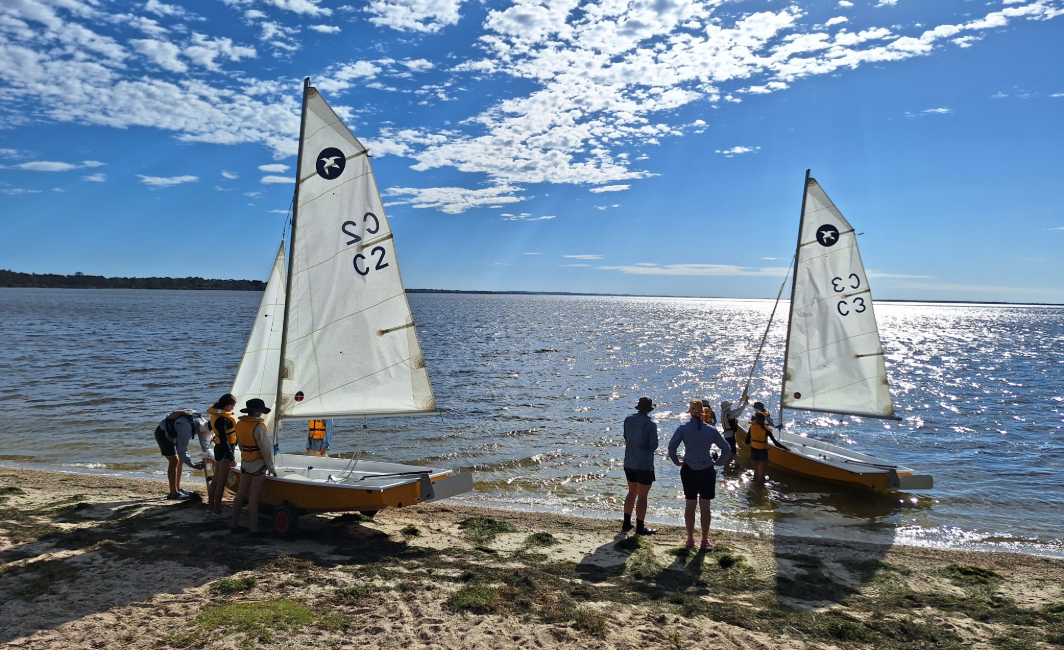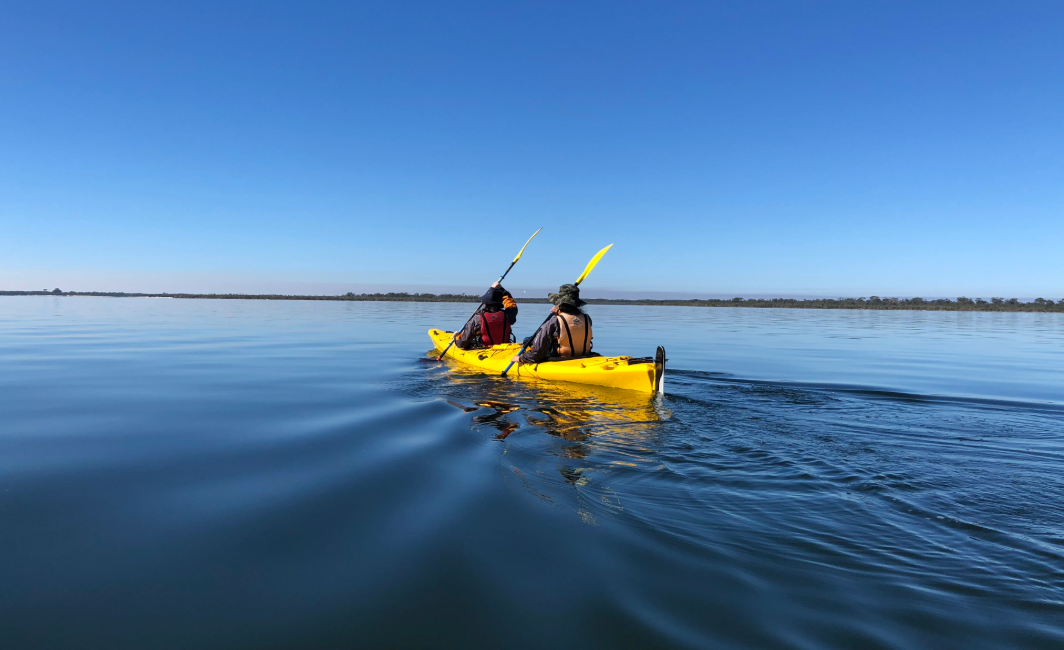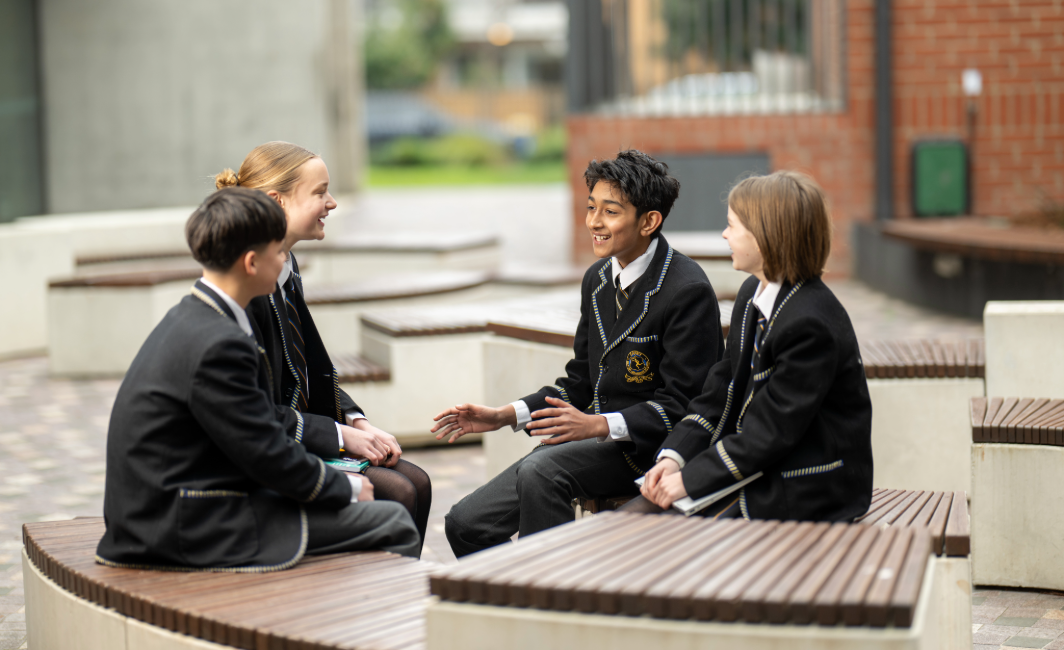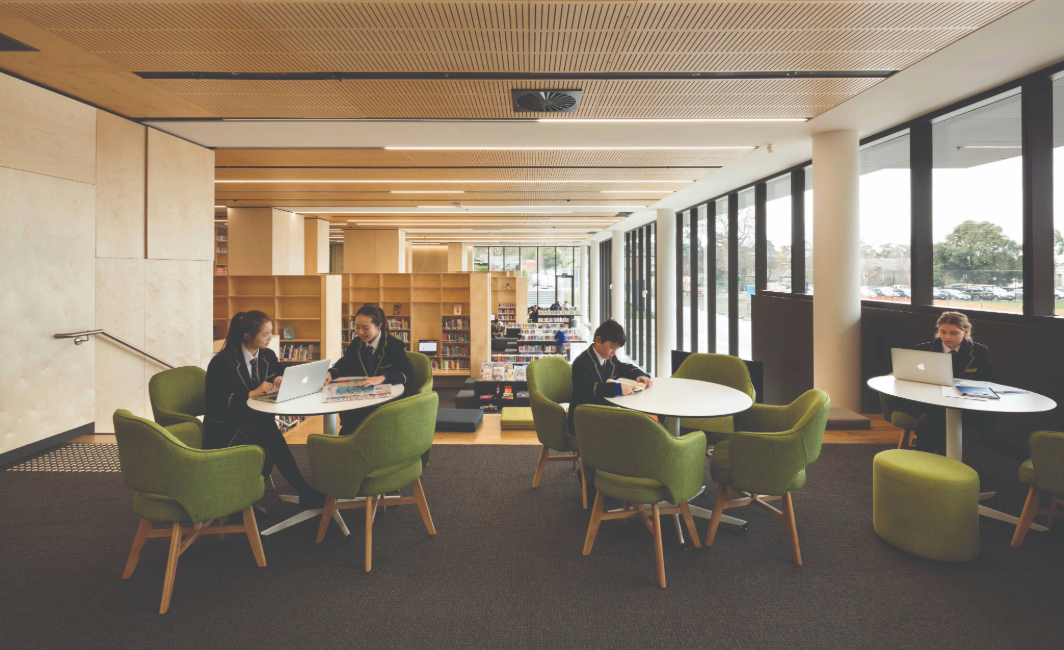Published 28 Apr 2025
Transitioning to Middle School success – Carey Baptist Grammar School
Engaged students in learning
Sarah Cassidy – Year 7 Coordinator
Carey Baptist Grammar School
Schools and early childhood services across Victoria continue to provide quality learning experiences across all levels. The VIT’s Professional Practice team is privileged to see this work first-hand on visits to workplaces around the state. This is just one example showcasing the great work happening in a Victorian school.
Understanding the need for unique support during the transition to middle schooling years, Year 7 Coordinator Sarah Cassidy and the team of teachers at Carey Baptist Grammar School have introduced a unique initiative. With an integrated approach to wellbeing and learning in mind, Year 7 teachers worked collaboratively to design and implement a Year 7 Learning Skills subject. Over the year, student achievement, engagement and wellbeing is supported and nurtured to ensure the learners are set up for their best chance of success.
The year-long subject focuses on explicitly teaching learners the skills to be able to learn effectively across all their subjects by providing students with the opportunity to put these skills into practice in Year 7 and beyond.
Q: Can you provide some background to your approach in developing the initiative, including any research or established models / strategies that your approach is based upon?
We know that the transition from primary to secondary school marks a period of tremendous growth and development in a young person’s life. For this reason, we wanted to build support structures for students across the middle years (Years 5–8). This meant establishing careful guidance to navigate the transition experience, and ensure students are supported to develop and build resilience, independence and successful learning habits.
We did this with a range of activities over the course of the year, with different focus areas each term.
Term 1 - building the foundational learning skills base to assist students in their transition to Year 7
Teachers run a number of digital sessions aimed to familiarise students with their new devices that play an essential role in accessing the curriculum and resources across all subjects. This begins with inviting parents to pick up the device with their child and participate in a briefing from our Digital Learning coaches, where they learn tips and tricks to help them use their device. We also hold a digital morning in the first week of the year to allow time and space for students to experiment with their new technology and learn from each other.
Students connect socially through structured games, and experiential programs such as an Outdoor Education program where each class embarks on a week long adventure on the Banksia Peninsula, getting to know each other outside the four walls of the classroom.
Term 2 – friendship and building positive relationships with peers and teachers
A parent forum evening is held where a panel of Year 7 teachers provide information and discuss strategies for supporting their child at home. The panel includes the Head of Student Wellbeing, the Leader of Learning – Health and PE and the Deputy Head of Middle School – Student Wellbeing, who each share strategies and talk about fostering positive relationships. The Leader of Learning for Health contextualises the information within the Health curriculum and provides parents with insights into what students learn in Health classes.
Term 3 – environment and sustainability
Students are invited to delve deeper into their own learning styles and develop study habits through understanding how the brain works and solve puzzles in small teams working through classroom mysteries and an ‘escape room’ scenario. The term ends with an immersive week where they choose from seven different locations around Victoria to visit as a team where they learn about their particular environment and sustainability, engage with the local community facilitated by Sally Nelson, Head of Integrated and Immersive Learning at Carey.
Term 4 – reflection
Year 7s have the chance to reflect on their personal and learning growth/development as they prepare for their transition into Year 8. They are tasked with creating a ‘How to Guide for Year 7’ including tips and tricks for their Year 6 peers who are about to undertake the transition.
Q: What structural things are in place to ensure that the initiative has its best chance of success?
The Learning Skills subject is designed around inquiry-based learning, investigation and project work. Sequenced lesson plans ensure consistency but still allow teachers to deliver lessons in a way that suits their teaching style, while meeting the individual needs of their learners.
In mapping out the Learning Skills curriculum, I worked closely with a Digital Learning Coach, Francesca Ohlert, to create lesson templates for teachers to use in their planning.

Outdoor Education Program at Carey Baptist Grammar School

Outdoor Education Program at Carey Baptist Grammar School
We carved our collaborative planning time for our Year 7 teaching team to design the course and ensure all members of the team were able to have input into the content and sequencing of the lessons. This ensured that all members of the team had ownership of the course and were able to harness their own individual learning styles and skills from a variety of learning areas.
All lesson resources are placed on the Canvas learning management system (LMS) for students to access with additional teacher resources available too. In terms of timetabling, the subject runs as a 75 min class each week with Year 7 Homeroom Teachers allotted a Learning Skills subject as part of their teaching load.
Reserving time at the end of the year to review, refine and update the Learning Skills course content and teaching resources has ensured that improvements and refinements are driven by the Year 7 teaching team. The team actively draw on student feedback to inform future changes to the subject. For example, end of year student survey data indicated a need to modify and update language such as key terms/concepts referred to in the Learning Skills subject so it’s relevant to the Year 7s and the demands that each subject places on them. The emergence of Generative AI and the use of large language models has also been an adjustment that we’ve had to make.
Q: What are the greatest benefits to staff development of this approach?
Year 7 subject teachers have developed a culture of collaboration where the team works together to establish consistent routines and expectations for their students. They found that setting strong expectations early had a positive impact as students moved through their Middle School journey.
For example, shared seating charts enable Year 7 teachers to see where students sit in classes. Seating charts (pinned to classroom walls) welcome students into the learning space by providing them with a designated place to sit. The seating chart template is customisable and following its successful implementation, it is now being widely utilised by teachers across other cohorts.
The intentional thinking that sits behind how to set up and structure a classroom for optimal learning has been instrumental in creating opportunities for the team to engage in reflective dialogue. There is a strong sense of collegiality and generosity in the way the teaching team share resources and support one another.
Additionally, Year 7 teachers have been able to celebrate the wins of the Learning Skills program as they see the direct benefit the program delivers to students. Our team share in the success when we see that our learners are developing and thriving.
Q: What have been the benefits to learner outcomes of this approach?
One of the activities in the Learning Skills program is the creation of a time capsule over the course of the year. Each student’s capsule is a decorated shoebox which they can contribute to throughout the year. At the end of Year 7, it is boxed up and stored by the school until the final day of Year 12, just before the students embark on their exam period.
The first item to be added is a letter that students write to themselves on the final night of the Year 7 Outdoor Education program at the beginning of the year. Students receive purpose-designed stationery featuring images of the natural landscape of the camp location to prompt their reflection and they each choose an image which speaks to their experience. Students seal up their letters and post them through a letterbox at the campsite our school has been using since the 1970s. The letters are then sent to the school and added to each learner’s time capsule. Time capsule creation is a highlight for Year 7 students who spend the year curating and filling their own personalised box with artefacts and mementos from across the year.
The time capsule project provides a wonderful opportunity for learners to connect with their family members throughout the transition period and paves the way for meaningful connections to be established between families and the broader school community. Through this process, parents, carers, grandparents and extended family members are encouraged to write letters for their learners which are added to the time capsule box.

Learners at Carey Baptist Grammar School

Learners at Carey Baptist Grammar School
A positive and supported Year 7 transition experience increases our learners’ sense of connection to school and the sense of belonging and community spirit is a very special part of Carey Baptist Grammar School. In fact, we often see many of our Year 12 graduates return to the school in a sport coaching role or other volunteer capacity.
We also found that by investing in creating a positive and supportive Year 7 transition experience, we increased students’ sense of connection and belonging to their school community, which benefits them in the years ahead.
Q: What plans does your workplace have to take this approach forward?
Looking to the future, the Year 7 teaching team will seek feedback from teachers across the school to see what skills we need to focus on building in our students for them to thrive and succeed in later years of schooling.
Plans are underway to map the key skill sets students need to develop to support their learning and personal success right from Year 7 to VCE/IB. This will include New Metrics Assessment in collaboration with the University of Melbourne to assess, credential and measure key competency areas such as critical thinking, active citizenship, collaboration and communication. We recognise that there is more than one way for students to demonstrate achievement and the New Metrics Assessment will eventually be embedded across teaching programs to promote greater student agency and provide each student with a competency-based portfolio to showcase achievement throughout their learning journey.
Student survey data also indicated there was strong interest from students to have the opportunity to design and peer-teach their own lessons. As a result, students can now store their lessons on our Canvas LMS so that they can peer-teach one another.
Moving forward, Year 7 teachers want to add a greater variety of lessons to the Canvas LMS so that students can self-differentiate by choosing a lesson they want to complete depending on their skill set and competencies.
Lastly, we are currently trialling a re-introducing a hard copy student planner. In previous years, students had not fully utilised the school planner and it was eventually phased out. However, this year we are bringing it back at Year 7 and will strategically teach our students how to use it in Learning Skills alongside digital tools such as ‘To Do’ lists and online calendars.
Our highly experienced Homeroom Teachers are passionate about working with Year 7 students at this important juncture in their learning, it is a pleasure working in such a dynamic and enthusiastic team including Alana Piotti, Crystal Webb, Lucy Soon, Dom Haley, Ashlee Baer, Lisa Dooley, David Bennett, Josh Prudden and Dr Eleni Notaras to give our students a positive and rewarding beginning to their Middle School journey.
Q: Can you detail any references or citations applicable?
- Primary and Secondary School Transition - Victorian Department of Education
- New Metrics, Transforming what we value in schools – University of Melbourne
- Middle School – Carey Baptist Grammar School.
Do you have an example of outstanding work in your school or early childhood service? We’d like to consider showcasing it the Excellence in Teaching section of our website. Send your example and contact details to vitcomms@vit.vic.edu.au.
